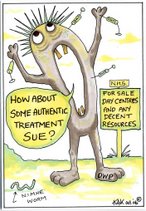We are carrying a Dec 31st 2008 Guardian article in full below . It's well written . The State under Labour is becoming paranoia-producing and grandiose (see the ex Director of Public Prosecutions cutting remarks in the article) in its ideas about capturing everyone's emails and web activities . Labour really is barking like a Nazi dog .
We at UserWatch know the UK State is very command and control orientated - very pro an admin-state over everyone's lives - we have seen this in mental health scenarios which have turned into oppressive work driven "recovery treatments" which do not relate to Patient Choice or authentic shaping by patients because there are no powers for most patients to create a culture of purchased supply of adequate recovery help. You cannot measure authentic choice until there is a reality of it being empowered and it lies outside of the NHS super-state ..
"State knows best" - except it does not - its a cheap over overmanaged overcostly anti individual suppressive mechanism . Keep those at the bottom on cheap means otherwise those in the middle will have to share more .. Won't they ? Come on get real everyone ... Just see what there is and what we have become .
The people that are creating this comand and control State aided and abetted by Govt who need their votes are the middle class administrators with top planners behind them - they live off it - and large charities do too - enjoying an unprecedented rise to power as Labour with its magical social weave merchants gives them privileged treatment , influence and access to lottery money as well as new reinforcing bureacracies .
Who are you though ? You out there ? You are a social experiment if you are a mental health User..
The new age approaching of a combination of a freer voice on the web and the suppression of individuation and locality innovation (unless it agrees with Govt objectives) together with mass capital removing productive capacity from whole nations and leaving them jobless appears to us to be potentially explosive or even creative ... Depending on who you are and whether or not you are a politician or administrator with a comfortable job that needs to believe in a system that delivers more comfortable reality for you ...
Supercontrol as a concept has emerged with a European super-state. Its emerged with China controlling so much of the world's industrial production of goods. Its emerged with a massive downturn of the economy because too much unrealistic credit was produced .. Its emerged because of massive oil dependence and the refusal of the world to stop worshipping the choking Gods of fossil fuels .. Systems are in a contrary mess, Karl Marx rises from his grave to re-criticise and there's a ray of light - suddenly he wakes up to photovoltaic possibilities...Well maybe ...
And when chaos appears like the cheeky internet and everyone's email thoughts so does the need to oppress it and regulate it and control it .... Make everyone behave the same way around in a context of fear - its easier than questioning the fucking mess we are all in because we played out credit and money contradictions and we produced classes of people to socially control others lives that we kept without authentic empowerment - healing and proper inclusion via a new form of realistic distribution of resources. Nahhhh why bother with that ..
Let them eat fake ... Fake work, fake life, fake empowerment, fake democracy ...
From the Guardian By Alan Travis and Richard Norton Taylor
The private sector will be asked to manage and run a communications database that will keep track of everyone's calls, emails, texts and internet use under a key option contained in a consultation paper to be published next month by Jacqui Smith, the home secretary.
A cabinet decision to put the management of the multibillion pound database of all UK communications traffic into private hands would be accompanied by tougher legal safeguards to guarantee against leaks and accidental data losses.
But in his strongest criticism yet of the superdatabase, Sir Ken Macdonald, the former director of public prosecutions, who has firsthand experience of working with intelligence and law enforcement agencies, told the Guardian such assurances would prove worthless in the long run and warned it would prove a "hellhouse" of personal private information.
"Authorisations for access might be written into statute. The most senior ministers and officials might be designated as scrutineers. But none of this means anything," said Macdonald. "All history tells us that reassurances like these are worthless in the long run. In the first security crisis the locks would loosen."
The home secretary postponed the introduction of legislation to set up the superdatabase in October and instead said she would publish a consultation paper in the new year setting out the proposal and the safeguards needed to protect civil liberties. She has emphasised that communications data, which gives the police the identity and location of the caller, texter or web surfer but not the content, has been used as important evidence in 95% of serious crime cases and almost all security service operations since 2004 including the Soham and 21/7 bombing cases.
Until now most communications traffic data has been held by phone companies and internet service providers for billing purposes but the growth of broadband phone services, chatrooms and anonymous online identities mean that is no longer the case.
The Home Office's interception modernisation programme, which is working on the superdatabase proposal, argues that it is no longer good enough for communications companies to be left to retrieve such data when requested by the police and intelligence services. A Home Office spokeswoman said last night the changes were needed so law enforcement agencies could maintain their ability to tackle serious crime and terrorism.
Senior Whitehall officials responsible for planning for a new database say there is a significant difference between having access to "communications data" - names and addresses of emails or telephone numbers, for example - and the actual contents of the communications. "We have been very clear that there are no plans for a database containing any content of emails, texts or conversations," the spokeswoman said.
External estimates of the cost of the superdatabase have been put as high as £12bn, twice the cost of the ID cards scheme, and the consultation paper, to be published towards the end of next month, will include an option of putting it into the hands of the private sector in an effort to cut costs. But such a decision is likely to fuel civil liberties concerns over data losses and leaks. Macdonald, who left his post as DPP in October, told the Guardian: "The tendency of the state to seek ever more powers of surveillance over its citizens may be driven by protective zeal. But the notion of total security is a paranoid fantasy which would destroy everything that makes living worthwhile. We must avoid surrendering our freedom as autonomous human beings to such an ugly future. We should make judgments that are compatible with our status as free people."
Maintaining the capacity to intercept suspicious communications was critical in an increasingly complex world, he said. "It is a process which can save lives and bring criminals to justice. But no other country is considering such a drastic step. This database would be an unimaginable hell-house of personal private information," he said. "It would be a complete readout of every citizen's life in the most intimate and demeaning detail. No government of any colour is to be trusted with such a roadmap to our souls."
The moment there was a security crisis the temptation for more commonplace access would be irresistible, he said.
Other critics of the plan point to the problems of keeping the database secure, both from the point of view of the technology and of deliberate leaks. The problem would be compounded if private companies manage the system. "If there is a breach of security in that database it would be utterly devastating," one said.
.






.jpg)






